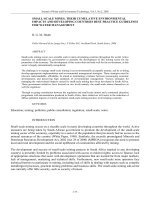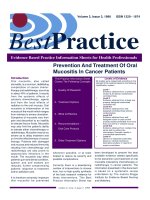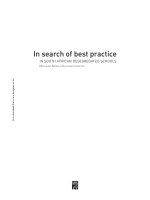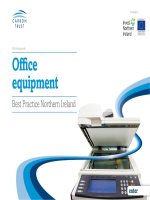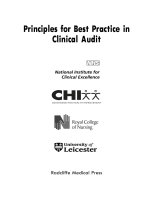43 Best practice Mathematics Paddy Shevlin ETI
Bạn đang xem bản rút gọn của tài liệu. Xem và tải ngay bản đầy đủ của tài liệu tại đây (429.43 KB, 17 trang )
Best practice
Mathematics
Paddy Shevlin
ETI
To start us thinking! A
question (and an answer)
• What is the difference between numeracy and
mathematics?
•
‘Numeracy is what you develop when you learn
mathematics well’ Quote from Anita Straker
Useful ETI references/documents:
•Better Mathematics (2006)
•Commentary on post-primary
mathematics teaching (2007)
•Follow-up to Better Mathematics
(2010)
•Best Practice Survey (2013)
Better Mathematics (ETI 2006) identifies best practice.
Effective T&L is in place when teachers: ( Suggestion
Use these as SC (success criteria) for TCN
•
Share the intended learning with the pupils at the
start of the lesson (1)
•
Recap and link the work to previous learning, or set
the work in an appropriate real-world context (2)
•
Provide clear exposition involving, where
appropriate, multiple explanations, with board-work
modelling what the pupils should do (3)
•
Use a variety of activities, including ICT and
practical equipment, which entails the pupils
working individually, in pairs or in groups (4)
More characteristics GP to
use
•
•
•
•
Provide opportunities for the pupils to problem-solve
Integrate, when appropriate, the use of effective mental
mathematics strategies (5)
Use skilful questioning, challenging the pupils’
understanding and requiring them to draw conclusions
and justify their thinking (6)
Highlight common misconceptions and exploit these in a
sensitive way (7)
More characteristics GP to
use
•
•
•
•
Relate the ongoing work to other parts of the course to
encourage the pupils to make interconnections and think
of mathematics holistically. (8)
Engage the pupils fully by ensuring that the lesson had
appropriate pace, challenge and progression. (9)
Teach step-by-step algorithms only when necessary. (10)
Encourage the pupils to think and talk about how they
learn and what they have learnt, often through
appropriate plenary sessions at the end of lessons.(11)
ETI Best Practice Survey
(ETI 2013)
•
The mathematics section of the Best Practice Survey
(2013) concludes:
Many of the characteristics of good practice illustrated in the
case studies are not new and can be best summed up by
teachers having high expectations for what the pupils
can achieve. This is mainly achieved by:
• having well-planned progression in the Schemes of
Work;
• challenging questioning which involves all; and
• rigorous follow-through of support given to pupils.
Contexts for the learningcrucial for effective learning
The use of interesting and meaningful contexts for the
learning is important for the promotion of numeracy
Key questions to ask and self evaluate as a mathematics
department and an individual mathematics teacher
•
When you the teacher are using a context as a
backcloth for teaching a maths lesson, is it appropriate
for the maturity and ability of the pupils?
•
Is the context engaging the pupils, or is it too contrived?
The role of the teacher
The role of the teacher when the pupils are engaging in
mathematics is crucial
Key questions (and statements below exemplify good
practice) to ask during self-evaluation and to use for TCN:
12. Is she/he circulating the room, providing ‘scaffolding’
support?
13. Is s/he intervening at whole class level when there
appears to be many of the pupils having the same
difficulty?
14. Are the whole-class questions open, challenging and
leading to mathematical thinking and discourse?
Well focused lessons
The degree to which the focus of the lesson is on well-defined
intended learning and has sharp success criteria including
mathematical content , processes and skills is important.
Key questions and for use as SC for TCN or other forms of SE
• Are the pupils clear about not only what they are doing but
also what they will be able to do as consequence? (15)
• Does the plenary consolidate and build on the intended
learning? (16)
• Is the plenary focused on success criteria and is
differentiation taken into account when thinking of SC?(17)
• Is the quality of the mathematical discourse good, taking into
account the maturity and ability of the pupils? (18)
ABOVE ALL
THE BIG PICTURE
Are all the pupils actively engaged in purposeful work
through which they are learning appropriate
mathematics?
Now comes the big
challenge for you
•
What can you as senior leaders do with this information ?
•
Make improvements!Close the loop!
•
Disseminate best practice
•
Take action through self evaluation either by yourself or
through your QACI ( Quality Assurance and Continous
Improvement ) team
HOW?
•
WHAT CAN I DO?
•
TO MAKE A DIFFERENCE!
•
TO IMPROVE THE PRACTICE!
•
TO KNOW THAT I HAVE DONE THIS! (EVIDENCE!)
•
NOT TO DESTROY ANOTHER RAIN FOREST!
Linkage of Indicators to
use of TCN: hence DGP
•
I have set out the possible SC for self evaluating best
practice – or at least some of them
•
Now further develop your self evaluation this year using
TCN (or collegiate book monitoring or “the voice” (along
with data if needed) to link indicators to self
evaluation to DGP as just described
TCN proforma
Focus of lesson: -----------Quality Indicators:
The pupils will be ------- well
The pupils will be -------- accurately
The pupils will be -----Strengths (6)
•
Suggested adjsts to learning (1)
The pupils could be ---Tear up after use
IF TCN A “ BRIDGE TOO
FAR” AT THIS POINT
•
USE ONE OTHER OF THE FOUR TYPES OF FIRST
HAND EVIDENCE?
•
WHAT ARE THEY?
•
BUT REMEMBER TO “CLOSE THE LOOP” EVALUATE
AGAIN TO SEE IF IMPROVEMENT!
The work in the books can be very informative:
1. Is the pupils’ self-marking being regularly monitored by the teacher?
2. Is there evidence that pupils’ errors are being identified and they are
receiving feedback?
3. Is there evidence the pupils’ corrections are being monitored?

